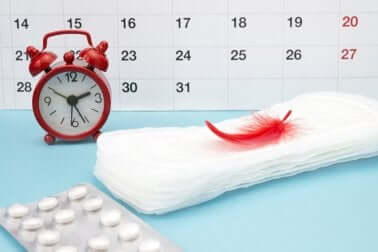Which Hormones Influence the Menstrual Cycle?
Several hormones influence the female menstrual cycle. They have specific roles which allow everything to develop normally. These hormones don’t only regulate the reproductive processes, but they also have an impact on mood and the appearance of the person’s skin, as well as many other aspects.
The hormones that influence the menstrual cycle, basically, guarantee that the ovum does what it needs to. By which we mean that the hormones create the necessary conditions for the ovum to be fertilized; and if not, to be released from the body.
These processes are complex and can only happen because the hormones that influence the menstrual cycle do their job. These hormones are as follows:
- FSH or follicle-stimulating hormone
- LH or luteinizing hormone
- Estrogen
- Progesterone
The menstrual cycle
The menstrual cycle consists of six internal cycles, and, in each one of them, the hormones have an important job. The cycles are the following:
- Ovarian cycle: this process happens within the ovary and includes two phases: follicular maturation and corpus luteum phase. In the former, the body produces a mature ovum and this culminates in ovulation; in the latter, the hormones create the organic conditions for fertilization.
- Endometrial cycle: in the endometrial cycle, the uterus lining thickens and vascularizes. Then, if the ovum isn’t fertilized, it detaches and the body expels it through menstruation.
- Endocervical cycle: this stage entails an increase in the mucus secretion until ovulation. This is to help the sperm reach the uterus. Then, in the final phase of the cycle, it loses these properties.
- Myometrial cycle: the myometrial is the muscular wall of the uterus. During ovulation, it contracts to help the sperm. After that, it rests.
- Vaginal cycle: similar to the endometrial cycle, there’s a thickening until ovulation, and if there’s no fertilization it sheds.
- Breast cycle: the breasts get bigger before menstruation, and they may feel tender. However, this symptom is inconsistent and everyone experiences it differently.

Keep reading: Is it True That Women’s Periods Synchronize?
The hypothalamus and the hormones that influence the menstrual cycle
The hormones that influence the menstrual cycle start their process in the hypothalamus. The hypothalamus secretes the gonadotropins (GnRH), whose main function is to stimulate the body’s production of other hormones that are necessary for the uterine cavity and the endometrium to be in a suitable state for conception.
In turn, the body also produces hormones that influence the menstrual cycle in the hypophysis or pituitary gland. The hypothalamus controls this gland and it’s responsible for secreting both the FSH and the LH hormones. Let’s take a deeper look:
- FSH or follicle-stimulating hormone: the body secrets this in the first part of the menstrual cycle and contributes to the ovum forming and maturing. It also stimulates the body’s production of estrogen.
- LH or luteinizing hormone: this cycle contributes to the ovulation process, facilitating the body’s secretion of progesterone. And, if the sperm fertilizes the ovum, it protects the pregnancy during the first few weeks.
In fact, the FSH facilitates the ovum forming and eventually becoming fertilized. In turn, the body quickly produces the LH; between 9 and 12 hours after this happens, the body releases the mature ovum and we get ovulation.

Discover more: What Can You Do About Painful Ovulation?
Ovaries and hormones
The ovaries also secrete some hormones during the menstrual cycle: estrogen and progesterone. Estrogen is a female sex hormone that influences the female genitals. Among its many functions, we can mention that it blocks another hormone, prolactin, whose role is to produce milk after birth.
In fact, there are several types of estrogen, but the most important one, from a menstrual cycle point of view, is estradiol. This hormone stimulates the endometrium to thicken and to vascularize, creating the perfect conditions for conception.
In addition to estrogen, there’s also progesterone. This hormone fulfills an important function in the menstrual cycle. It helps to mature the endometrium and causes changes within the whole reproductive system. Its main effects are as follows:
- Adapting the breasts for breastfeeding.
- Reducing the activity of the mucus in the endometrium so that there are no uterine contractions that impede the pregnancy.
- Raising the body temperature to help with fertilization.
- Reducing the amount of cervical mucus to slow down other sperms when the ovum has been fertilized.
All cited sources were thoroughly reviewed by our team to ensure their quality, reliability, currency, and validity. The bibliography of this article was considered reliable and of academic or scientific accuracy.
Otero Dadín, C., Rodríguez Salgado, D., & Andrade Fernández, E. (2009). Ciclos naturales de las hormonas sexuales y diferencias entre sexos en memoria. Actas Españolas de Psiquiatría, 37(2).
This text is provided for informational purposes only and does not replace consultation with a professional. If in doubt, consult your specialist.








